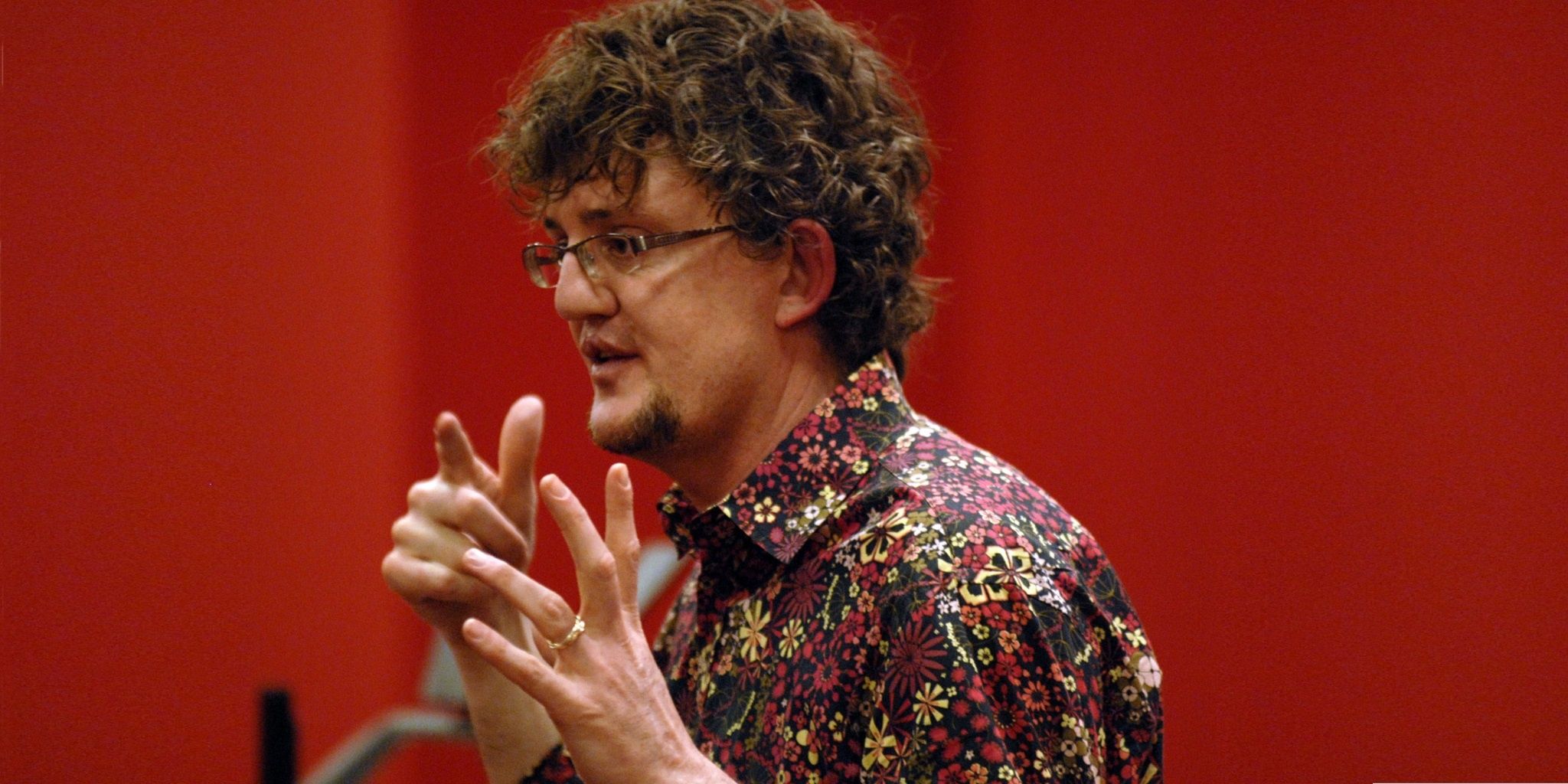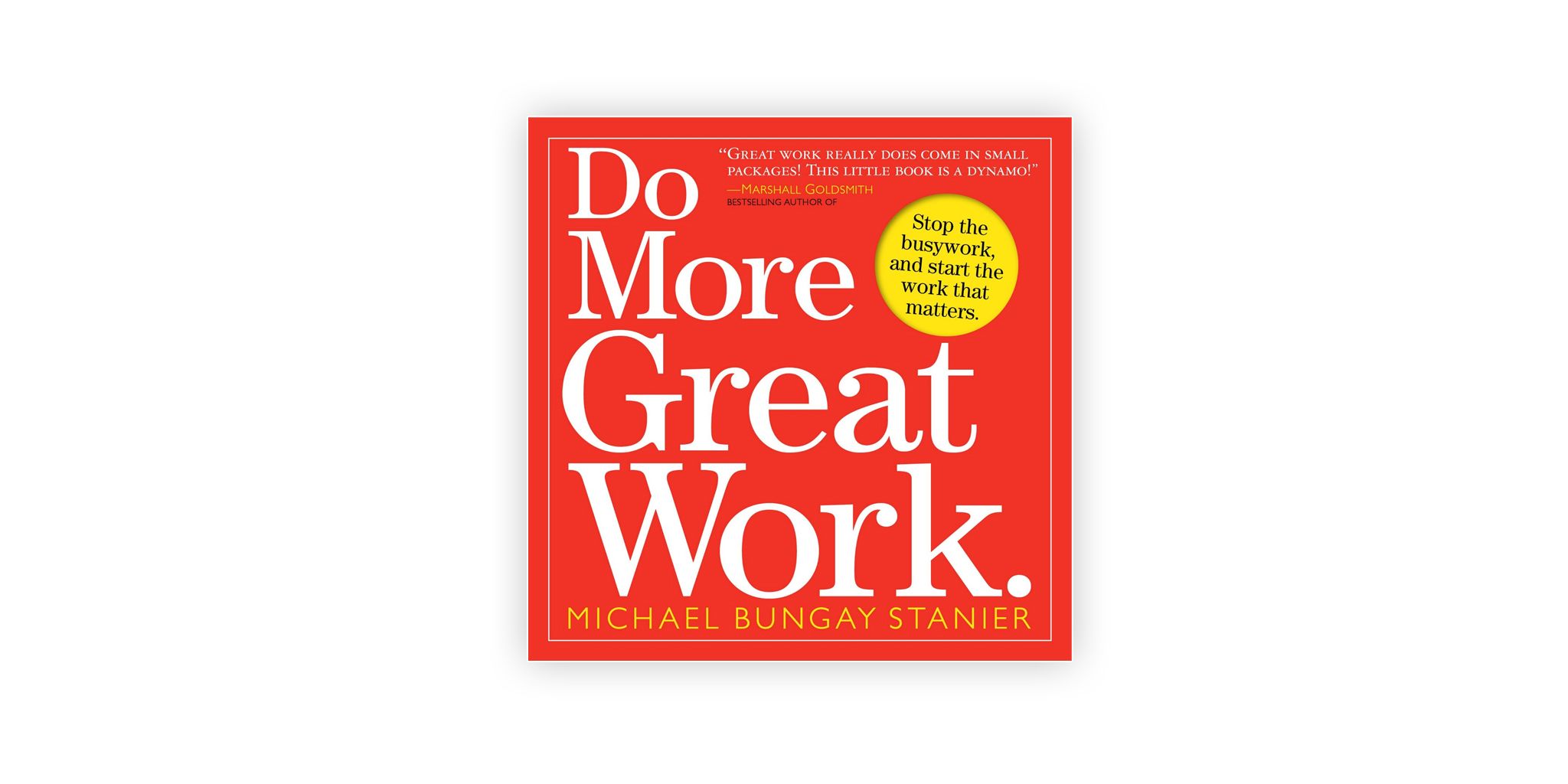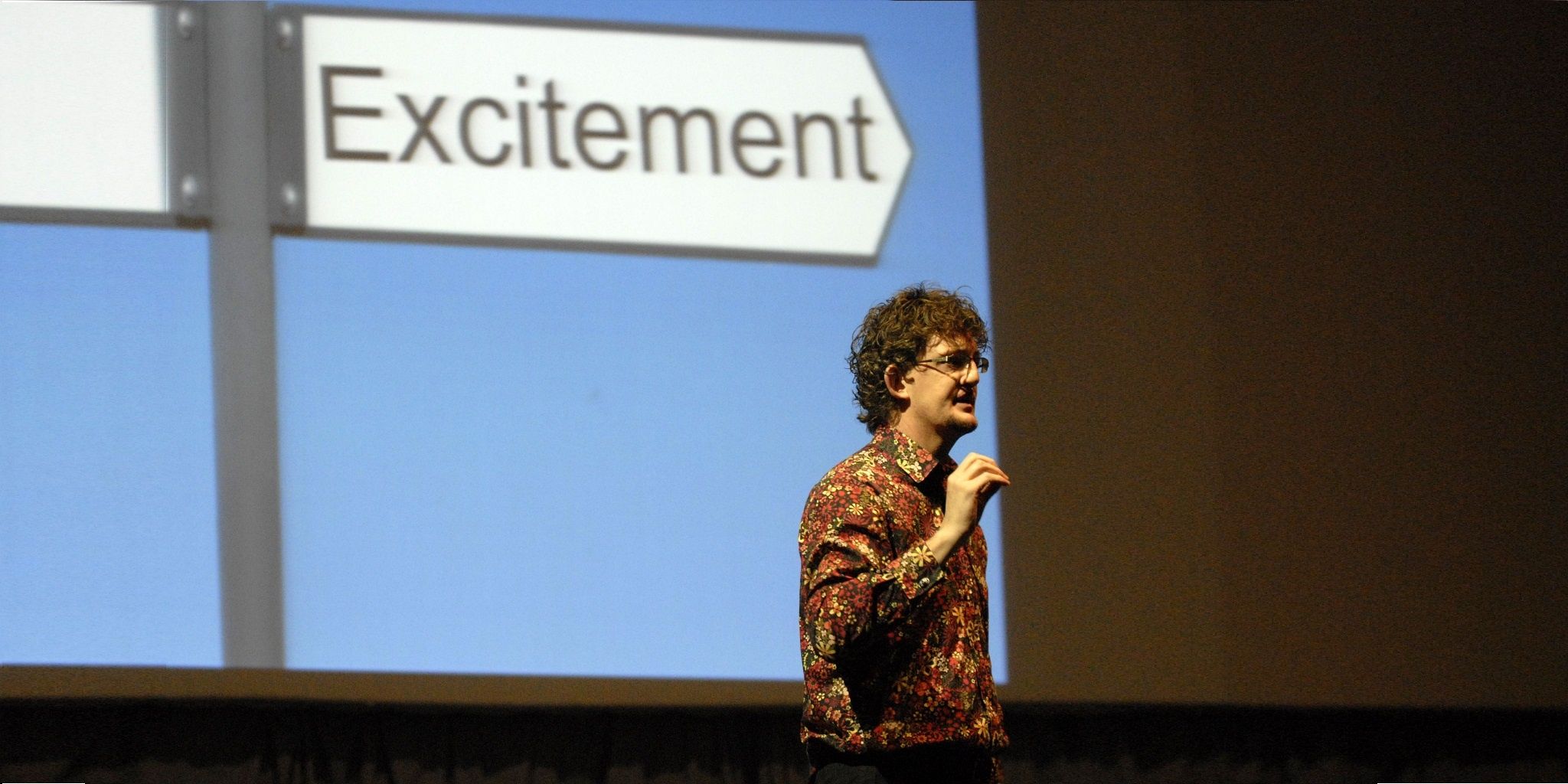Interview with Michael Bungay Stanier
Michael: You’re saying that all the work we do can be divided into three categories: bad work, good work and great work. Can you explain to our readers how you differentiate the three and what’s great work for you personally?
Michael Bungay Stanier: That’s a great place to start, Michael. Here’s a snap-shot definition of each type of work:
Bad Work is a waste of time, energy, and life. Doing it once is one time too many. This is not something to be polite about. It’s not something to be resigned to. This is the work that is pointless.
Sadly, organizations have a gift at continuing to generate Bad Work. It shows up as bureaucracy, interminable meetings, outdated processes that waste everyone’s time, and other ways of doing things that squelch you rather than help you grow.
Good Work is the familiar, useful, productive work you do and do well. Good Work is how you spend most of your time, and there’s nothing wrong with it. This work blossoms from your training, your education, the path you’ve travelled so far — all in all, it’s a source of comfort, nourishment and success.
There’s a range of good work. At one end, the more engaging and interesting work. At the other, work that is more mundane but you’re happy to spend some of your time doing it.
You always need Good Work in your life. At an organizational level, Good Work is vital. It is a company’s bread and butter, the efficient, focused, profitable work that delivers next quarter’s returns.
Great Work is what we want more of. This is the work that is meaningful to you, that has an impact and makes a difference. It inspires, stretches, and provokes. Great Work is the work that matters.
It is a source of both deep comfort and engagement, the “flow zone” where time stands still and you feel you’re working at your best and effortlessly. The comfort comes from its connection — its “sight line” — to what is most meaningful to you, your values, beliefs, and aspirations.
But Great Work is also a place of uncertainty and discomfort. The discomfort arises because the work is new and challenging and as a result, there’s an element of risk and possible failure. Because this is work that matters, work that you care about, you don’t want it to fail. And because it’s new and challenging, there’s a chance that it might.
For organizations, Great Work drives strategic difference, innovation, and longevity. Often it’s the kind of innovative work that pushes business forward—that leads to new products, more efficient systems, and increased profits.
Let me put it another way. You know how there’s some work you do that’s meaningful and important and makes a difference? And then there’s the rest of the stuff you do and that somehow fills up your days? Great Work is the first type. And I want you to do more of that.
What’s Great Work for me? It’s been interesting to see how that’s evolved over time. For instance, when I started being a full time coach about a decade ago, that was my Great Work. I’d wait by the phone with sweaty hands and a fast-beating heart, waiting for the client to call. Now, I’d consider that Good Work - still love doing it, but it’s no longer an edge for me. My Great Work now is focused on writing my next book — based around my short movie, The Eight Irresistible Principles of Fun and also supporting my leaders for our Coaching for Great Work program. There are 16 based around the world, so building a community within this group is exciting and definitely Great Work.
Michael: What I’ve found out after reading your book is that to do great work, you should decline good work. How to do that? How do you convince yourself to ditch good work and start great work? Can you give examples from your life how you’ve declined good work to do great work?
Michael Bungay Stanier: It’s one of the deep truths about doing more Great Work. You need to decide on what to say Yes to … and what to say No to.
There are two challenges with that — saying No to yourself and saying No to others.
Saying No to yourself is difficult because Good Work is a comfortable place to hang out and be. Even though Great Work is our where the more meaningful, more engaging work lives - we’re constantly pulled back to the familiarity and certainty of doing Good Work. It is an act of courage to decide what Good Work you want to say No to, so you can free up more time, space and energy to do Great Work.
It is also difficult to say No to most people, especially colleagues in the work place. Here’s my best tip for this. Think of your goal not as saying No – but as “saying Yes more slowly.” Part of what trips us up is how our default is set to saying Yes and saying Yes quickly. If you can just slow things down a little - and the best way to do this is to get curious and ask questions about what’s being asked of you — then you’ll end up not committing yourself to so much.
Michael: You are saying, that physically how you are, helps determine how you think. That our body is not just a “head-carrier”. How important is it then? What’s your physical position for great work?
Michael Bungay Stanier: I’m a big believer in this: If you want to change the way you think, change your body and change your environment. I know that when I sit down at my computer, that’s a place for me to do Good Work. Everything says: “be productive, be efficient, process your work, get through stuff.” For me to do my Great Work — for instance, writing my next book, I need to be somewhere else to do that. I’ve got another small desk set up in my office where (most of the time at least) I keep nothing but a few inspirational tokens that I keep for writing and thinking. I also have a cafe about 10 minutes away from my office where I occasionally go.
Michael: I really liked your creative question “is this true?”. Every now and then I get feedback on my Nozbe application from a user who says — “your app doesn’t have X and Y feature, nobody would every use this without it.” And I know I have tens of thousands of users who are happily using my app! Same applies to this magazine. I really need to ask myself this powerful question quite often. And in your life? When recently you did have to ask yourself this question, what have you learned from that?
Michael Bungay Stanier: Part of the secret to doing more Great Work is to get more mindful about what work you’re doing, clearer about the “why”. Quite often — just like in your example — we get thrown into a situation where others and ourself starting making judgements about what’s going on that spark us into action. Slowing it down by asking “is that true?” helps you stop and make the best possible choice on where you spend your time.
I use this question a lot to manage myself from overreacting to feedback I get. For instance, today I just received a collation of feedback from a keynote I gave at a conference. It was mostly very positive, and it also had some less than positive comments — not terrible just not ‘two thumbs up’ — which got me going down the path of “I wasn’t very good, I’m never any good at this, I should just stop speaking, etc etc.” By pulling back and asking myself “are their comments true, is my inner dialogue true?” I can calm myself down and collect myself.
Michael: When I started my Nozbe app, I was a one-man shop. Now I have a team to support me with my business. I started the Productive Magazine with a friend who actually designed the magazine into what it is today. Now I have a team of editors (Lori, Dustin) who help me out. Tell me Michael, what support do you have and what support do you need?
Michael Bungay Stanier: I truly believe that you can’t do Great Work by yourself. If you’re smart, you build up a team — people who can provide technical, intellectual and emotional support.
So I have a coach who I use as a sounding board and strategic thinker and who I’ve worked with for three years. I have a “brain trust”, a mastermind group where I can show up and be confused and despairing and also people who know my blind spots and kick me in the arse when required. I have a full time office manager, and two or three fantastic operations people who help manage the various systems that make the business run. We’ve got some great technical experts - a designer, a web person, a flash movie maker. And I’m just creating another team to lead a project that will culminate in January. Bottom line: I have a ton of support, and I’m deeply grateful for it.
Michael: As a Twitter user and the magazine editor, I’m measuring the increase of my Twitter followers, downloads of the magazine, etc. — to see if what I do makes any impact. Tell me Michael, what are you measuring? What should we be measuring? Why is it important?
Michael Bungay Stanier: Metrics are tricky - they can turn into an end in themselves, rather than a means to an end. At least, that’s the excuse I make for me not measuring very much. I have a few financial metrics, I do a regular check in on how much Great Work I’m doing, I keep an eye on the number of subscribers to my newsletter. And also — and this is an important metric — I keep an eye on how much fun I’m having. I want to do work that is fun. Occasionally, I’ll find myself getting way too serious about everything, and that doesn’t help me or the people I serve.

Michael: We very often tend to think about an idea and just go into action, but you’re asking this question: “what is possible?” to make us think of coming up with different possibilities before we go into action. Can you tell us about your recent challenges and what new possibilities have you come up with it?
Michael Bungay Stanier: Rather than tell you about my challenges and the possibilities around them — which is probably more interesting to me than anyone else - let me suggest my five favourite questions for generating possibilities.
The first is to ask, after you’ve defined your challenge and the ideas you already have. Ask yourself “and what else?” until you run out of ideas. That’s always a good start and you almost always have more ideas than you thought.
Then ask these three questions:
- What’s the easiest thing to do?
- What could I do that would have the most impact?
- What do I want to do?
Those three questions will help generate an interesting range of possibilities. And then you just need to ask yourself: What WILL you do?
Michael: I really liked your question about building stories. So what’s your story? How did you create a scenario planning for your book? What were the stories and which one came true?
Michael Bungay Stanier: You’re referring to one of the “maps” from the book, where you imagine different stories for whatever your Great Work project might be. It’s a great exercise for bringing to life your ambition and to test the extent of your risk. I use two questions as part of this process:
What would extraordinary look like? This starts stretching what’s possible and allows me to imagine brave thoughts — working on the principle that “once a mind has been stretched, it can never shrink back to its original size.” (I’m not sure who first said that, but I love the quote.)
What wouldn’t I do to make this a success? This is powerful because once you’ve clarified what you wouldn’t do — you have a lot of stuff left over that you WOULD do. This to opens up possibilities.
And then, you have a choice. Having imagined what’s possible, what do you want to strive for? How much courage do you have? How much risk are you willing to take?
One of my stories is about Find Your Great Work becoming a mainstream success — and that narrative is still unfolding.
Michael: So now that your book is out and all, “what will make the biggest difference” in your life? Where are you heading? What’s the next big thing or the next small thing that’ll make the big leap?
Michael Bungay Stanier: I’m doing all I can to stay focused on two projects — helping Find Your Great Work be a success, and supporting my cadre of global leaders for our Coaching for Great Work program. It’s taking quite a lot of discipline, because I’m always tempted to run off and start something new. Pushing through to this next phase of implementation is my current learning edge.
Michael: OK Michael — I’ve read your book, made lots of notes and I’m inspired to do more great work (thus this new issue of Productive Magazine). In a napkin-size answer — please let our readers know why our they should get your book? How will the book help them find their great work?
Michael Bungay Stanier: Thanks for asking, Michael. Here people can find out more about the book.
There’s also a ton of free resources at the sight — some great podcasts on Great Work (including with some past stars of this magazine, David Allen and Guy Kawasaki), plenty of downloads and a ton of stuff you can grab to do more Great Work.


